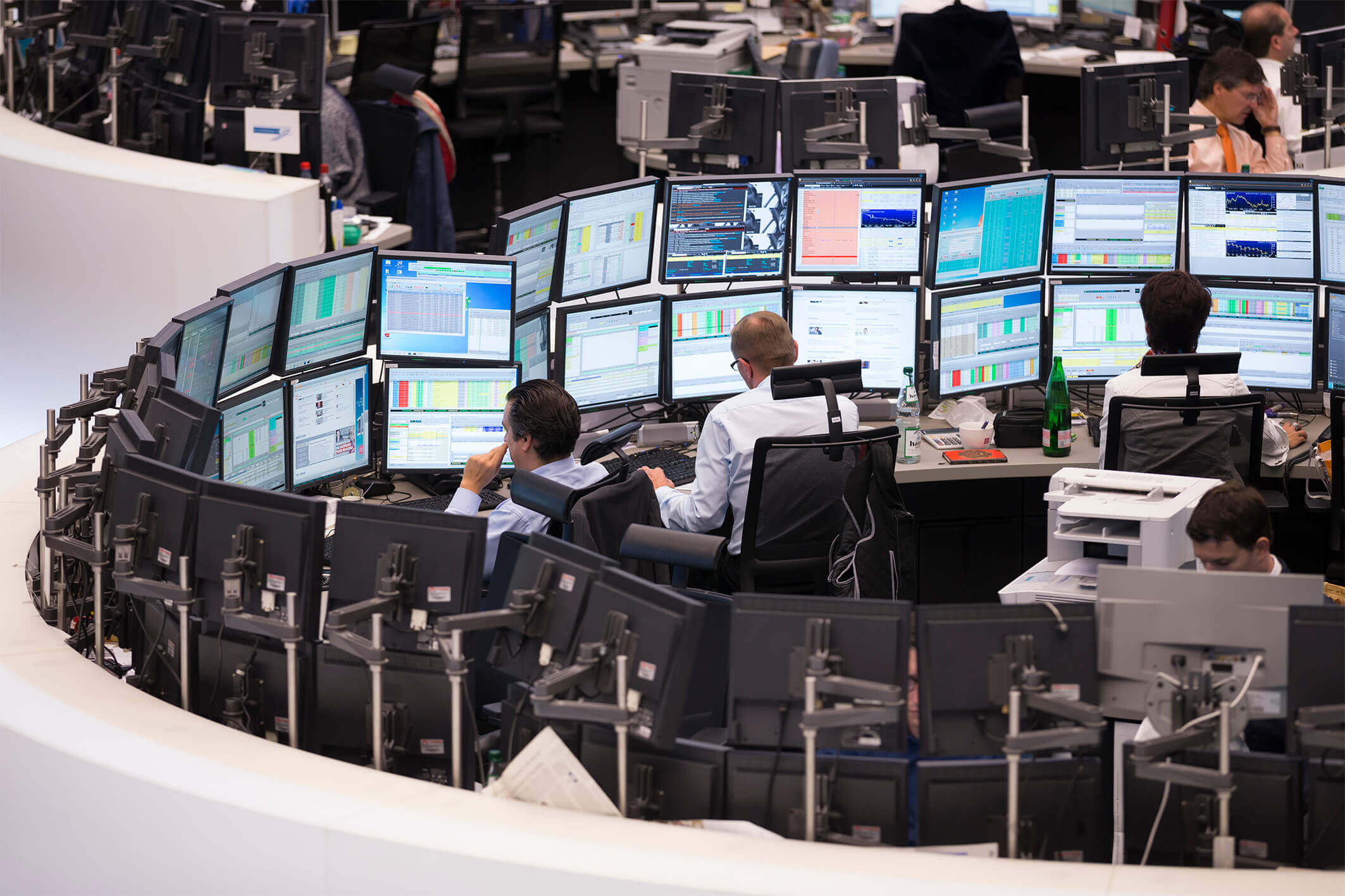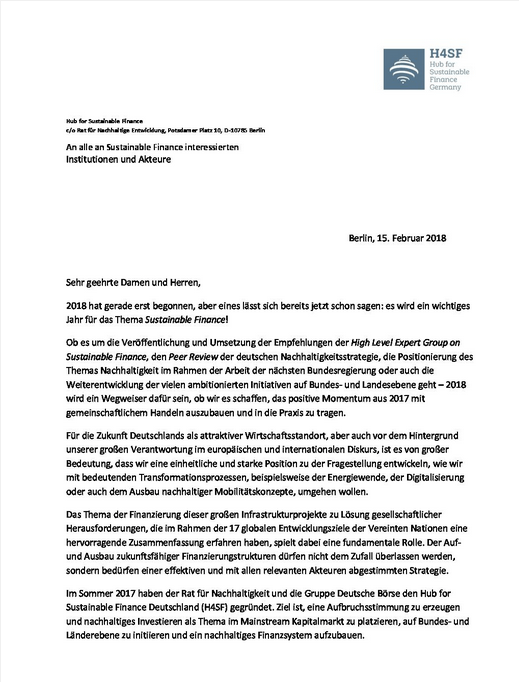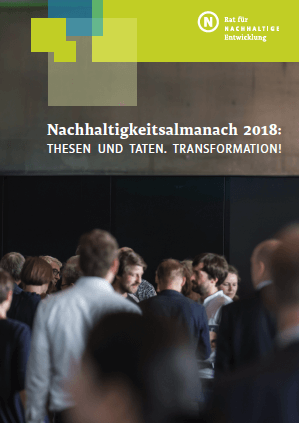The German Council for Sustainable Development (RNE) first included the issue of sustainable finance in its work programme in autumn 2016. Its activities since then have been bearing fruit: the Federal Government set up a sustainable finance advisory council in June 2019. The RNE is monitoring its work as an observer.

Traders on the floor at Deutsche Börse: throughout Germany, people are discussing how to make the financial markets more sustainable. Photo: Deutsche Börse AG
Unfortunately, the latest figures show that Germany is still lagging behind its European counterparts when it comes to the topic of sustainable finance. However, players from the Federal Government, state governments and authorities, the financial market and civil society are now taking a leading position in the discussion about how financing can be made more sustainable. The activities of the past three years have left no doubt as to whether a sustainable financial sector is needed. A sustainable finance advisory council has now started work. Falling under the responsibility of the Federal Ministry of Finance (BMF) and the Federal Ministry for the Environment, Nature Conservation and Nuclear Safety (BMU) and assisted by the Federal Ministry for Economic Affairs and Energy (BMWi), its remit is to develop a sustainable finance strategy. An initial draft strategy and the interim findings of the advisory council’s working groups will be presented at the third German Sustainable Finance Summit in Frankfurt on 16 October 2019.
The RNE established the Hub for Sustainable Finance (H4SF) as an open network comprising financial market players and other stakeholders who wish to contribute to developing a sustainable financial system in Germany.
The topics the Hub concerns itself with are oriented towards the ten recommendations for sustainable finance in Germany. Contributors are invited to develop their own avenues and approaches to bringing about change within the framework of these recommendations. The concrete form involvement may take is at the discretion of contributors.
You can find a brief presentation about the Hub for Sustainable Finance here.
Food for thought regarding sustainable finance in Germany
In February 2019 the German Council for Sustainable Development (RNE) issued a recommendation for the Federal Government’s consideration. Based on dialogues surrounding sustainable finance, it also called for institutionalised discussion to be established at Federal Government level.

- 02/08/2019
- Recommendations & statements
Sustainable finance: the Federal Government’s supporting role
Recommendation from the German Council for Sustainable Development to the State Secretaries’ Committee for Sustainable Development on 25 February 2019 on the topic of sustainable finance; Berlin, 8 February 2019
In addition, key recommendations by the Steering Committee of the Hub for Sustainable Finance were discussed and presented in autumn 2017 at the first German Sustainable Finance Summit. They were derived from the content overlap between the:
- interim report of the High Level Expert Group on Sustainable Finance of the European Commission,
- the PRI Roadmap for Germany,
- the Living Document Sustainable Finance produced by the German Council for Sustainable Development (RNE),
- the goals of the Accelerating Sustainable Finance Initiative of Deutsche Börse and
- the recommendations of the Task Force on Climate-related Financial Disclosures of the Financial Stability Board.
It is noteworthy that these initiatives all worked in parallel and published their content at the same time.
The topics the Hub concerns itself with are oriented towards the ten recommendations for sustainable finance in Germany. Contributors are invited to develop their own avenues and approaches to bringing about change within the framework of these recommendations. The concrete form involvement may take is at the discretion of contributors.
The Hub invites contributions from:
- institutions that represent the finance sector, the business community, civil society, the political arena or the scientific community and
- those who plan to furnish input aligned with the ten recommendations that expands the knowledge base or adds factually or scientifically founded viewpoints that are constructive to a hotly discussed topic.
The RNE newsletter offers additional updates on recent developments. You can subscribe to the newsletter here:
Subscribe to newsletter on topics related to sustainability policy (only in German)
Documentation of the second German Sustainable Finance Summit held on 26/09/2018
The first impetus for bringing new momentum to the debate on co-regulation processes for a sustainable financial sector in Germany came from the RNE in early 2017 – initially under the key term “green finance”.
This topic is one of the focus areas of the Council’s current work. Former Council member Achim Steiner, who has been Head of the UN Development Programme (UNDP) since 19 June, and Council member Alexander Bassen, Professor of Capital Markets and Management at the University of Hamburg, had prepared a discussion paper together with Council Secretary General Günther Bachmann as a “living document” and opened up discourse on the paper in a specialist panel.
On 12/06/2017 the Council invited a range of experts to engage in an open dialogue on these first ideas and recommendations on the topic. Participating experts from the political arena, the financial sector and civil society comprised representatives of the federal environmental and finance ministries as well as the state of North-Rhine Westphalia, from banks and other financial institutions, consumer protection, impact investing and a variety of non-profit organisations with ties to the financial sector.
The living document had already been presented in March 2017 at the PAGE Conference, in the State Secretaries’ Committee on Sustainable Development and at the RNE’s annual conference, among others. A key proposition of this document was to establish in Germany a “Hub for Sustainable Finance”, through which the numerous and varied stakeholders could collaborate. “A key step on this path was the expert panel,” commented Alexander Bassen, summarising the main results of the event.
The first task was to create a common basis for discussion, and the results from the panel served to more concretely specify and improve and amend the “living document”, define some of the issues more clearly and examine possible levers for taking the topic forward. The participants were united in their view that the many activities being pursued in parallel by various bodies needed to be coordinated so as to be able to tap into synergy effects and promote constructive dialogue.

